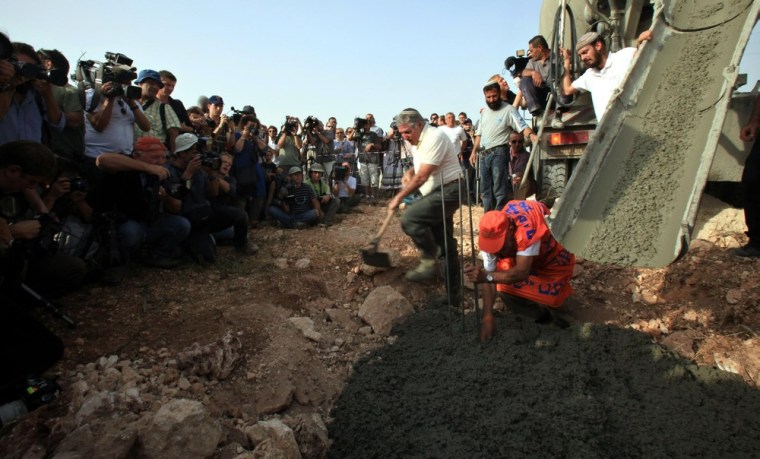Palestinians would not immediately end peace talks with Israel if it did not extend a 10-month limited settlement moratorium expiring on Sunday, Palestinian President Mahmoud Abbas was quoted as saying.
In another sign that a way could be found out of a crisis threatening negotiations that began less than a month ago, Israeli Defence Minister Ehud Barak said there was more than an even chance the peace process would continue.
Abbas has said repeatedly he would walk out of direct negotiations with Israel unless the partial halt to building remained in place. Palestinians view Israel's settlements as a formidable obstacle to statehood.
But asked in an interview conducted on Friday with pan-Arab newspaper al-Hayat whether he would declare an end to the negotiations if the partial construction freeze did not continue, Abbas said: "No, we will go back to the Palestinian institutions, to the Arab (League) follow-up committee."
He was referring to an Arab League forum that gave him the go-ahead to pursue direct peace talks with Israel that began on Sept. 2. The 10-month settlement moratorium expires at midnight (2200 GMT) on Sunday.
Obama has urged Israel to continue the freeze, but Prime Minister Benjamin Netanyahu, whose coalition is packed with pro-settler parties, has offered only to limit the scope of renewed building rather than order a moratorium extension.
Israeli and Palestinian officials met U.S. diplomats in New York over the weekend to try to find a solution and to prevent the much-heralded negotiations from falling at the first hurdle.
Israeli Defense Minister Ehud Barak, who held talks over the past several days in New York on the issue, said there was a better than even chance the peace negotiations would continue even without a moratorium.
"I think that the chance of achieving a mutually agreed understanding about (a) moratorium is 50-50. I think that the chances of having a peace process is much higher," he said in a BBC interview.
"Israel must choose between peace and the continuation of settlements," Palestinian President Mahmoud Abbas said in an address to the United Nations General Assembly Saturday.
He said the Palestinians and the wider Middle East are continuously pushed into "the corner of violence and conflict" as a result of Israel's "mentality of expansion and domination."
State Department spokesman P.J. Crowley said Washington was "doing everything we can to keep the parties in the direct talks." He said U.S. special envoy on the Middle East, George Mitchell, met Abbas for 30 minutes on Saturday.
Though the freeze expires at midnight, some of Netanyahu's allies, including members of his own Likud party, are planning to mark the end of the moratorium earlier, by holding a cornerstone-laying ceremony for new homes in the remote Revava settlement in the northern West Bank at sundown on Sunday.
Israeli settlers had hauled construction equipment into a Jewish settlement deep inside the West Bank, officials said Saturday, preparing to break ground on a new housing project.
Open to compromise?
With the clock ticking, U.S. Secretary of State Hillary Rodham Clinton was trying to broker a last-minute compromise before Sunday's midnight deadline in hopes of averting a breakdown in talks.
Abbas and top Israeli officials, including the defense minister and Netanyahu's chief negotiator, were all in the U.S. working on the issue. Clinton has urged both sides not to take provocative actions that could derail the negotiations.
As negotiations proceeded in the U.S., there were signs that both sides are willing to compromise.
While Abbas hinted that he would not halt negotiations even if the moratorium was not extended, Netanyahu has signaled that future construction will be far less than the thousands of new homes currently in the pipeline.
An Israeli official familiar with Defense Minister Ehud Barak's negotiations in the U.S. said Israel had floated the idea of requiring all future construction to be personally approved by Barak. This scenario would essentially leave the current restrictions in place without formally declaring so.
The official spoke on condition of anonymity because he was discussing internal deliberations.
Still, Israel's military chief last week warned that violence could erupt if peace talks break down — a concern that was underscored by rioting in east Jerusalem following the shooting death of a Palestinian man Wednesday.
Violence broke out again Saturday, as Israeli riot troops clashed with Palestinian protesters demonstrating against a settlement near the West Bank city of Hebron. An Associated Press photographer was briefly detained and roughed up by security forces and suffered a broken rib. The army claimed the photographer had refused calls to allow troops to operate.
